My friends, there is too much dang TV. Between all the networks and cable subscriptions and streamers, there is just no way to account for all the great stuff that happened this decade—especially in light of the so-called Era of Peak TV. Our Top 30 of the Decade was comprehensive to be sure, but it’s just not possible for any one person to consume everything. So, some stuff fell through the cracks. Maybe it was too niche for even our eagle-eyed hipster contributors to capture. Maybe it was a late 2019 release, raising questions over whether such a late-game admission could rank on a decade list. Maybe it was plainly beat out by the likes of MAD MEN and BREAKING BAD, but is noteworthy nonetheless. As such—it seemed right to create a place for the shows we loved and lost in the 2010s. Please enjoy this outpouring of support for our Honorable Mentions—and let he who watched every new show this decade cast the first stone! [Kate Brogden, TV Editor]
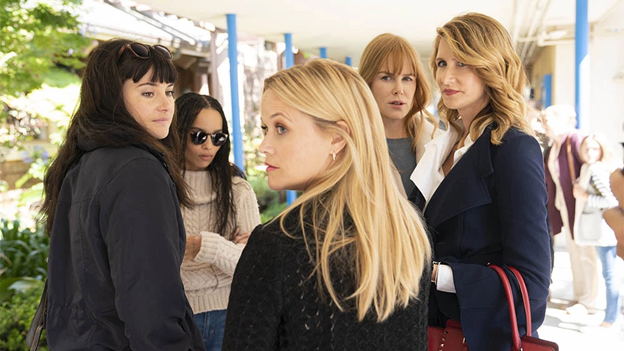
BIG LITTLE LIES (HBO)
Perhaps its beleaguered (but not all-that-bad) second season soured some of the milk. Perhaps the staggering gravitational pull of GoT was too much for poor HBO subscribers to wrest themselves out of. Perhaps people still foolishly assume it’s soapy refuse that isn’t to be bothered with. Whatever the reason, BIG LITTLE LIES deserved to be on our End of Decade list, but alas, we’ll have to settle with an Honorable Mention.
Put bluntly, S1 was one of the most pleasantly surprising television viewing experiences I had this decade: a word-of-mouth sleeper juggernaut that was impossible to turn away from as soon as the pilot ran its course. With a shut-the-fuck-up level of talent in the core cast of Nicole Kidman, Reese Witherspoon, Shailene Woodley, and Zoe Kravitz, not to mention another firebrand outing from recent worldwide favorite Laura Dern, S1 took the pithy pulp of the original beachside novel and imbued it with enough arthouse gravitas via director Jean-Marc Vallee to spin heads on each and every side of the popular/critical divide. Immaculately crafted, expertly adapted to the screen, and with enough twists and turns to make the most stalwart among us gasp, it was quietly among the best event television outings the decade had to offer.
As for S2… well, look, they did Andrea Arnold dirty, and we hate them for it, but people were far too quick to dismiss the season on the basis of the first few episodes lacking a certain sense of smoldering restraint the first season had. What it did have, however, was Meryl Streep joining the aforementioned shut-the-fuck-up level of talent in one of the best roles of her career. Yes, I mean it, and will take no further questions at this time. Those willing to let S2 breathe would be treated with an exceptionally triumphant arc and increased screen presence for Dern; Streep playing one of the most sympathetic villains ever committed to the screen, big or small; the core cast continuing to piece together their shattered lives as best they could after the devastating cliffhanger of a S1 finale; and an underrated series finale as far as giving closure to a cast of characters we came to know and love goes. It’s contained, it knocks the vast majority of its scripted television peers out of the park, S1 is a 420-minute “film” you can rate on Letterboxd dot com, what’s not to love? Stop reading this list and go watch it. Come back to read more, though. [Thomas Seraydarian]
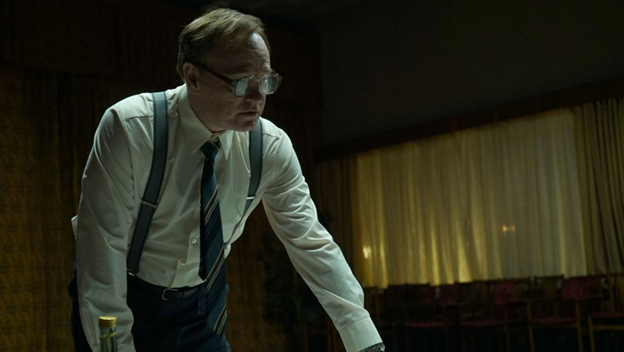
CHERNOBYL (HBO)
Part historical drama, part docuseries-lite, and all bad vibes, CHERNOBYL is up there with VANILLA ICE GOES AMISH as the most upsetting thing I’ve ever seen televised. One of these items earned that honor as a deserved indictment, while the other is a testament to the unpleasant implications that come with telling hard truths. A re-enactment of the biggest nuclear and ecological disaster in history, CHERNOBYL becomes doubly terrifying when you realize much of its nightmarish imagery has been replicated from the plethora of stock footage taken during the incident. CHERNOBYL valorizes Dr. Valery Legasov, the chief investigator into the meltdown and a key player in the effort to contain its aftermath, as he is repeatedly stymied by a political machine that would rather pretend the event never transpired than take responsibility for it. Jared Harris’ inspired performance creates an emotional locus the audience can invest in, allowing the narrative to branch out to cover all of those involved on every level of the emergency. I’ll keep saying it: DUNKIRK walked so CHERNOBYL could run. But while Nolan’s depiction of a desperate rescue mission showcases the best of human spirit and ingenuity, CHERNOBYL also exposes our worst qualities. The apocalypse was averted in 1988 through breathtaking feats of engineering, but the sacrifices required would make anyone wonder if we were worth the cost. CHERNOBYL captures this morbid price in outrageously graphic detail, and the haunting score that accompanies it serves as a constant reminder to the audience that they are witnessing the physical and spiritual death of a nation. In our uncertain times, CHERNOBYL delivers the least comforting message that can be told—you would not be faulted for scrolling past this on HBO Now for some CURB rewatches—but you know what they say about those who ignore the mistakes of the past. [Ed Dutcher]
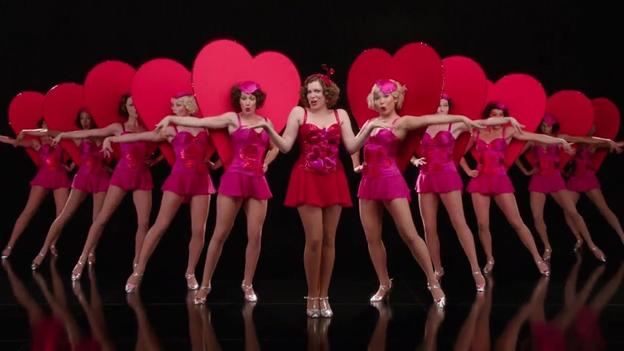
CRAZY EX-GIRLFRIEND (The CW)
I remember that big, pink heart balloon on the billboard over the 405 freeway. I drove past it twice a week on my way to my unpaid internship in Santa Monica—a whopping 2.5-hour commute from Orange County, which gave me plenty of time to ruminate on just what on Earth a show called CRAZY EX-GIRLFRIEND could possibly have to offer me. It wasn’t until our very own Ed Dutcher gave it a glowing review back in the Crossfader days that my interest was officially piqued. If getting me to watch CRAZY EX-GIRLFRIEND is the only contribution that running this section makes to my life, it will have all been worth it.
CXG is a hallmark of amazing 2010s television. There is so much about this show that shouldn’t work: the premise feels more like a movie, it hinges itself on a star that made her bones on YouTube, it’s a made-for-TV musical with new songs every week… and yet, it works better than most shows I watched this decade. It’s the first show that comes to mind when I think of dedication to authentic storytelling. Rachel Bloom and Aline Brosh McKenna’s multiple appearances on the SCRIPTNOTES podcast are spent discussing how they made a point to surround themselves with writers whose authentic experiences could speak to the series. And it shows. UTIs from sex. Having a drunk sleepover with your gal pals and generalizing about men. Researching your crush’s new girlfriend obsessively. The horrors of butthole waxing and shapewear. The awkwardness of getting sucked into a group hang. The special relationship every woman has with the very first penis she sees. Filipino priests that play basketball. It’s all there. If I decided to count the number of times this show made me feel like it had read my diary, we’d be here until the sun burns out. All of this—and it’s well-written, well-acted, and funny? Done deal!
Diversity was a big deal this decade, to say the least. CRAZY EX-GIRLFRIEND is the prime example of diverse, authentic storytelling that doesn’t succumb to halfhearted tokenism. It showcases diversity in ethnicity and experience in a sensitive way that also just so happens to make for an amazing series. Bloom and Brosh-McKenna built an amazing team around their incredible vision, and I couldn’t have asked for a better, weirder, dare I say crazier show this decade. And this has nothing to do with the fact that Rachel Bloom and I are best friends now. Because we are. Best friends. Definitely. [Kate Brogden]
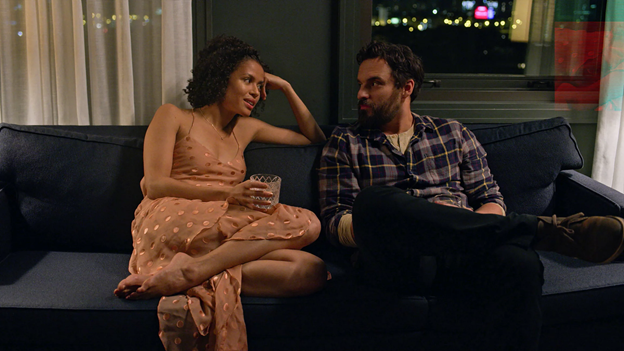
EASY (Netflix)
Joe Swanberg’s EASY often looks like an episode of TERRACE HOUSE: slow but measured pacing with an allowance and appreciation for silence and awkward but true interactions, giving insight to the little details inside the fact that we’re all attempting to get on the mend, or are at least thinking about it. Swanberg’s anthology series naturally took on the risks of its own high concept, which is an unpredictability in terms of content, but his approach to essentially making eight-or-so short films per season kept his unique sensibilities on and exercising at all times, even if you don’t love an episode. What most saw as boring or passive actually held something therapeutic, bursting with potential and empathy that let the audience know they’re doing okay on their path, or that there’s always a tomorrow.
One of the best accomplishments of EASY’s three-season run is a three-episode arc depicting the struggles of a married couple played by Michael Chernus and Elisabeth Reaser. It starts with sexual roleplay and challenging gender roles in S1, choosing to open their relationship in S2, and exploring the complicated consequences of their choices in S3 in a feature-length episode that culminates in a 20-minute-long conversation at a bar, where the rhythm is far from fancy and our characters frustrate themselves in trying to think of the right things to say to the point of sometimes breaking down sighing instead of making a point at all. It’s riveting, harrowing, and tragic in a way that’s rarely palpable enough to have a real effect upon the viewer. It’s made abundantly clear how not-okay they are, and how the sloppiness of life through Swanberg’s loving but willingly visceral worldview will ultimately prevent glossy catharsis. It is sad, and it is rooted in the real. EASY is perhaps one of the kinder-hearted shows this side of TAXI without ever being cloying. It gives its characters, and its audience, a fighting chance.
If EASY, and Swanberg’s work overall, can have a mission statement of some sort, it comes in the form of a very knowing and understanding hug. The show presents characters struggling and in fear of little and big things alike, overall stressing about change and what, if anything, is ever sure. S1 captures this cosmic anxiety in a masterfully crafted episode following Gugu M’Btha Raw as an actress breaking up with her boyfriend to move across the country for a job. There’s a lot of silence and pensive, heart-aching score filling the air as she wanders around Chicago, contemplating her place within the city, her relationship, her work, the world, and the universe. Swanberg pits her wanting silhouette against the ever-expanding cosmos beyond us as she tours a Planetarium. But Swanberg’s ultimate grace note comes at the end when she attends a party and is prompted to play a game casually named “Skittles”; pull a rip-cord, send a spinning top into a maze of pegs to get knocked over. Another character posits “it looks random, but there’s skill to it.” Our hero pulls the cord, and Swanberg gives us a top-down wide shot view, witnessing the spinning top stumble its way into and out of dead ends, toward and around opportune pegs. It knocks out some here and there, and spins out farther than you’d expect by the end, knocking out some more in the process. Then it’s all over.
It’s a shame the show’s life ended after three seasons, as there’s power in checking in on these souls time after time. It was felt and appreciated by a quiet few, just like Swanberg’s other works. Mumblecore has grown up and moved on for the most part, but EASY’s willingness to explore the painful moments of choice and determination we put ourselves through time and time again is worth appreciating. It presents a level of sincerity that is so hard to find elsewhere in the medium, and should be permeating throughout the veins of art as a whole. Escapism granted, we turn to art to see a little of ourselves, given the chance to transcend. EASY presented a cloudy mirror coated with graffiti and missing a glass chip or two; it ain’t all perfect, and that’s quite alright. [Rocky Pajarito]
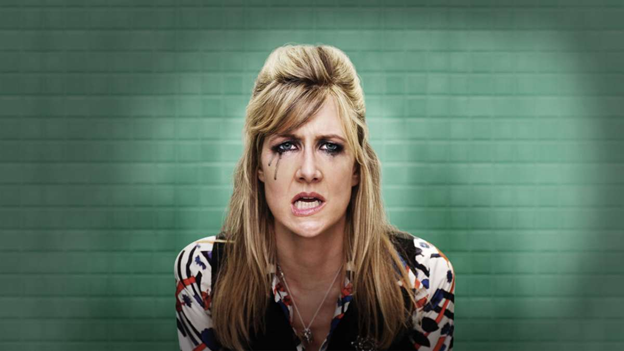
ENLIGHTENED (HBO)
Comedy doesn’t necessarily have to make you laugh to be funny. If you’ve ever heard or told a joke that made someone brightly announce “oh, that’s funny,” you’re familiar with how that can work. It’s a close cousin of “clapter,” the joke/politics hybrid that pretty much every late night program leans heavily on at this point. ENLIGHTENED introduced both of these concepts way back in 2011, a time when the word “fuck” was needlessly injected into every HBO program just because it felt so good to finally hear it on TV. The protagonist Amy Jellicoe (Laura Dern) doesn’t say “fuck” terribly often. Instead, she’s converted from a corporate cog into a starry-eyed idealist by an island resort rehab program, and you can’t help but root for despite her unbearable smugness.
ENLIGHTENED got my attention not because it’s uproariously funny or because it has a particularly powerful message in 2020; but viewed as a museum piece, as an ancestor to shows like MASTER OF NONE, THE GOOD PLACE, and even THE LATE SHOW WITH STEPHEN COLBERT, it’s fascinating to consider just how prescient the show was. Lasting exactly long enough to establish its voice but not long enough for that voice to go hoarse, ENLIGHTENED feels like a gentle brain massage. The jokes elicit a grin here and there and the messages are scattered but generally on the right side of history. This show would be absolutely buried by its descendants were it to come out today, but sometimes it’s nice to look back and understand where things came from. ENLIGHTENED got me to say “oh, that’s funny.” It’s not laughter, but maintaining that exact level of humor for 20 episodes is its own marvel. [Dan Blomquist]
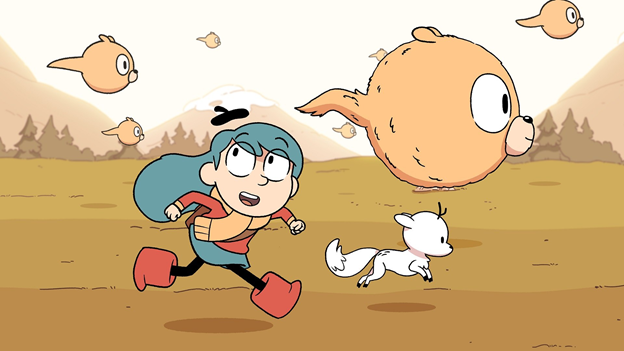
HILDA (Netflix)
It is an unfortunate fact that kids’ animation is usually overlooked in these many editorials and look-backs at the decade that are currently peppering the Internet. Too bad, because this past decade provided some of the most ground-breaking animated shows for children in both storytelling and artistry. HILDA is one such show, offering a beautifully designed magical world combined with the usual growing pains of being a kid. I wrote a dedicated piece for this magazine about why everyone, not just animation fans, should be watching HILDA, but for the sake of this blurb, I will reiterate some of my main points. HILDA is a gentle show, reflecting many of the mythological aspects of its Scandanavian setting. Despite this gentleness, it is never boring, constantly hinting at another world beyond ours and pushing both the main characters and the viewers to take the time to look at a problem from every angle and discover solutions by talking things out instead of running headfirst at it and hoping it works out somehow. The world of HILDA is the world I desperately wanted to exist in as a child—a modern world with television but also with trolls and monsters and friendly sentient clouds to play with. There is something deep and genuine and otherworldly about HILDA that speaks to the child that still lives within me, and very few shows, animated or not, have ever had that effect. Give it a chance, and reawaken the sleeping child in you, too. [Anna Mansager]
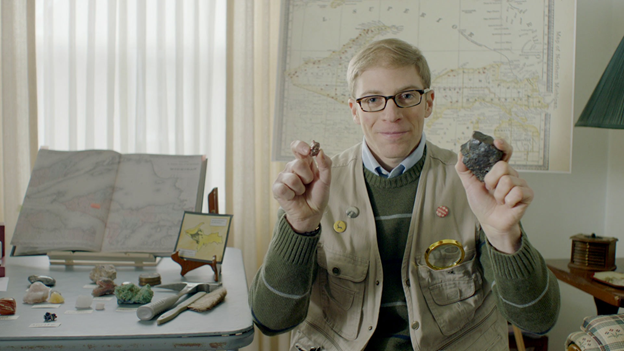
JOE PERA TALKS WITH YOU (Adult Swim)
If I had to spend the rest of my life alone on a spaceship with only one piece of media to watch, I think it might have to be “Joe Pera Reads You the Church Announcements”—I believe it could carry me through a lifetime of soul-crushing isolation. There are many movies, albums, and TV shows that as a whole mean more to me than this single episode of a weird web series/TV show, but JOE PERA TALKS WITH YOU is a remarkable candle in dark times. Burrowing deep into the collective sense memories of every deeply repressed white male, the show is a salve and a promise of a way out of the tunnel. Joe Pera is a soft man, crippled by layer upon layer of anxieties he can only barely begin to articulate or grapple with, yet all he wants out of life is to share small comforts and joys with you as best he can. I have never felt a more pure rush of serotonin than I got the first time I watched Joe tell a church congregation about his newfound love of “Baba O’Reily” by The Who. At the end of our brutal decade, in which any faith in common human decency has nearly been completely shattered, Joe reminds us of the power of sharing the things that bring us joy as earnestly as we can. Comedy completely immersed itself in black-pill ironic nihilism this decade. Hell, we all sort of sat back and let Trump get elected; culturally, we all resigned ourselves to things only being awful forever, but that has to end eventually. I need to believe that we’re going to collectively decide that life is worth living in the 2020s, that there are things worth existing for, and Joe Pera gave me a shimmer of hope that we might just make the choice to keep going. [Carter Moon]
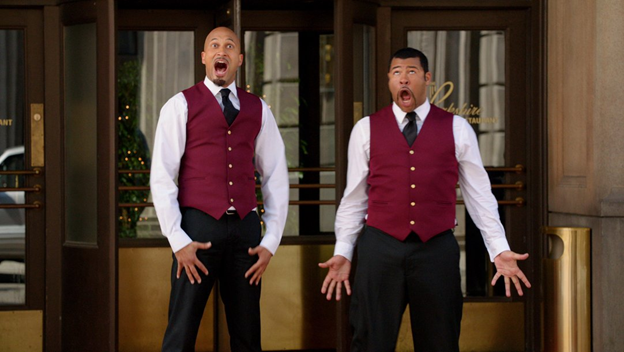
KEY & PEELE (Comedy Central)
These days Jordan Peele is more commonly known as the writer/director of the hit horror films GET OUT and US, but his serious contribution to the comedy world along with partner Keegan Michael Key in their sketch show KEY & PEELE shouldn’t be ignored. Beginning each episode with a bit of stand-up that was related to Key and Peele’s lives and would usually later relate to one of the sketches, the two comedians wrote and starred in five-to-seven sketches per episode, with rarely a dud in the whole run of the show. They also provided a unique voice in the comedy world in that many of the sketches focused on the Black experience in America, a subject usually reserved for Emmy-bait dramas. Not only did KEY & PEELE provide a fresh comedic voice, but it also worked as a training ground for Jordan Peele as a horror director (the sketch “Turbulence” comes to mind). BLACK LADY SKETCH SHOW’s horror underpinnings owe a lot to KEY & PEELE, as does the hard-hitting political commentary of Netflix’s ASTRONOMY CLUB. There are still stylized sketch shows out there, but they don’t have the same edge and vision that KEY & PEELE did. They sent ripples through the comedy world that paved the way for black comedians in sketch comedy and kickstarted the sketch-aissance we’re currently seeing through I THINK YOU SHOULD LEAVE. They deserve to be recognized for it. [Anna Mansager]
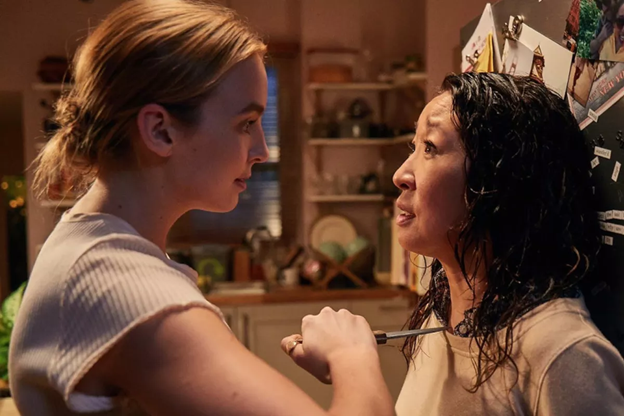
KILLING EVE (BBC)
The smartest decision you can make when creating a TV show about a government agent hunting an international assassin starring Sandra Oh, is to hold on her face. Just really get a good close-up of it. You could launch a thousand ships with the wide expanse of expressiveness Oh carries around daily. Her full-faced frowns, big, wet tears, and open-mouthed cackling are full of feeling and energy, the kind of things that can carry a show without even really meaning to. It’s good, then, that KILLING EVE has more than just that going for it. The child of FLEABAG’s Phoebe Waller-Bridge and some canny optioning by the fine folks of the BBC, KILLING EVE is a spicy, thrilling, and often humorous play in the spy genre sandbox that manages to drag in all the currently popular elements of the serial killer genre to boot. Based off a series of novellas by Luke Jennings, KILLING EVE takes the knowingly saucy tone of the books and explodes them across the screen, finding female obsession and something like love in between that viscera.
The show, while filled with talent in the supporting cast, is really a two-hander: Jodie Comer on one side as the childish Villanelle and Sandra Oh on the other as the dogged MI5 agent Eve Polastri. Their cat and mouse game is the heart of the story, crashing together so spectacularly in the finale of the first season that new showrunner Emerald Fennel struggled to build on the structure in the show’s second. What’s never lost, and what even to an outsider is most compelling, is the centering of a female perspective. KILLING EVE values elaborate murders and shadowy conspiracies just as much as the tricky thing that is femininity and the ways that power can be found in subverting it, playing towards it, and understanding it. Eve is obsessed with Villanelle for her beauty and her intelligence, but also because Villanelle seems to be operating with a different understanding of womanhood than Eve has ever considered. It’s KILLING EVE’s marriage of thoughtful consideration of gender and stylish spy antics that skyrocketed its popularity. There isn’t another show doing exactly what it does, with the level of competency demonstrated. Where the show could go given the more narratively destructive conclusion of its second season remains to be seen, but with a third and fourth on the way, with new showrunners attached to each, the only thing that remains to be killed is Eve’s old understanding of herself. Fitting, given the title. [Ian Campbell]
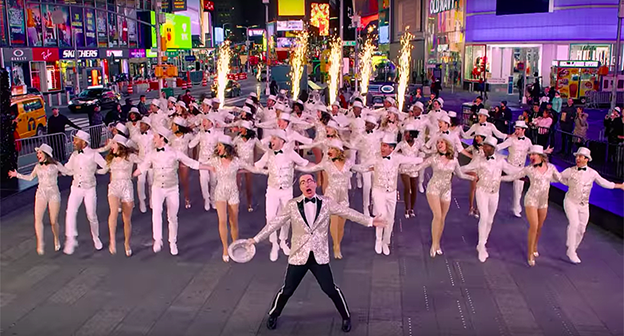
LAST WEEK TONIGHT WITH JOHN OLIVER (HBO)
I am not a regular viewer of LAST WEEK TONIGHT WITH JOHN OLIVER by any stretch of the imagination. I, like many, catch the program’s 20-minute expose portion of the show on YouTube on Monday morning, as whatever shenanigans he chooses to highlight make their way through the Twitter-verse and viral news cycle. Frequently that 20 minutes is good for a few laughs (Oliver’s brand of shtick and wry British delivery can feel admittedly thin all these years later but I still find his persona engaging) and has the potential to be decently informative.
LAST WEEK TONIGHT, like all political shows, exists on a spectrum, and there are those that view Oliver as either too moderate to be an effective political communicator or too Hollywood, bordering on vapidly performative. But regardless of him or the format, I’m hard-pressed to think of a show that’s had more of a transformative impact on the genre of late night than the longform HBO show. Oliver and his team of writers were committing to actionable politics far before Jimmy Kimmel was crying on stage about healthcare, and even if it should be taken with a grain of salt as all political programs should, I have to think you can look at the show’s impact as a net gain. From the direct influence his show had on the groundswell of emails and messages sent to the FCC regarding net neutrality to forcing conversations about the wealth inequality in scholarship opportunities through the MIss America Organization or highlighting the sinister background of Robocalls, Oliver’s monologues inspire dialogue and even—potentially—change. That studious vigor is something other late night hosts have attempted to adopt over the later part of the decade (Samantha Bee, Seth Meyers, Jimmy Kimmel) as political commentary became the trend, but none have pulled it off quite so effortlessly. Longform political comedy on HBO should be cringy, and certainly LAST WEEK TONIGHT can be guilty of that at times, but frequently it’s a late night show that feels vital while so many have regressed to casual viewing. [CJ Simonson]
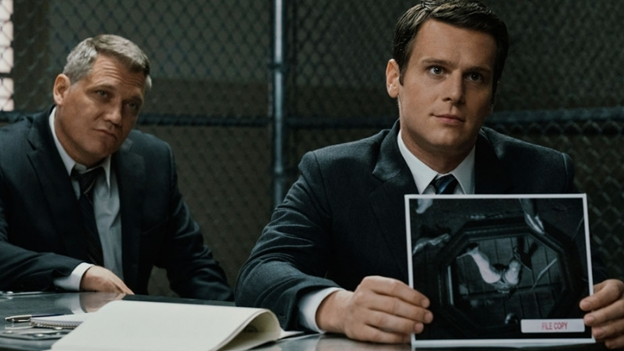
MINDHUNTER (Netflix)
“Why true crime now?” is a stupid question. True crime magazines, serial killer memorabilia, and a general obsession with the macabre has been a part of human culture since the first hangman was hung. So, while the current true crime boom is nothing new, it is evolving—and MINDHUNTER gave us its most perfect evolution. Joe Penhall and David Fincher’s true crime opus came creeping onto the scene in 2017, heavily marketed toward the serial-killer-obsessed as a retelling of the scientific inquiry that coined the very term “serial killer.” It delivered what we knew we’d get: a solid overarching mystery, cameos from your favorite heavy-hitting serial killers, and plenty of opportunities for true crime buffs to blurt out trivia while watching with their unsuspecting friends. What we didn’t know we were getting was a perfect synthesis of the old and new, along with a delicate hand to scratch the itch while staying away from the dangerous waters of villain worship.
MINDHUNTER is the modern evolution of the network crime serial. Little hour-long mysteries come and go a la LAW & ORDER and NCIS, but they’re knit together with the overarching narrative and top-notch production value a major streamer provides. It’s a show that does its homework, nailing each killer with terrifying accuracy (particularly standout Ed Kemper) to the deep satisfaction of any true crime podcast junkie. And yet, it walks a line that few series of its kind are able to walk: showcasing the aspects of serial killers that make them interesting, while also outing them as dumbasses and weirdos who should not be admired. Holden’s arc in S1 where he begins to identify with Kemper and the overarching mystery of S2 which examines the fraught relationship between the police and communities of color touch are the two most significant issues with the true crime movement. The way MINDHUNTER sneaks these topics in to its core audience is not only successful, it’s morally commendable.
There was literally too much television to properly acknowledge this decade, but we’d be remiss to not at least mention MINDHUNTER. It’s the perfect distillation of our fascination with true crime this decade, and future series in the genre (of which I’m sure there will be kajillions) would do right to follow its example. Rather than asking “why true crime now,” we should all be asking ourselves “why not MINDHUNTER sooner?” [Kate Brogden]
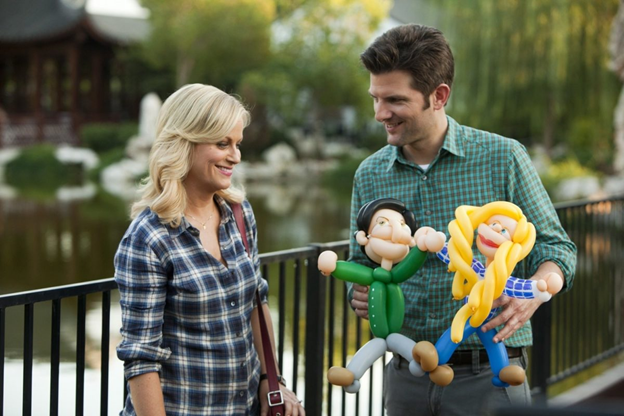
PARKS AND RECREATION (NBC)
Television, particularly political television, often has a tendency to capture the spirit of the time it’s in. In 1999, THE WEST WING captured the pragmatic and perpetually hopeful spirit of the Clinton era. Over a decade later, the world would be introduced to VEEP, where kindness and productivity gave way to cynicism and idiocracy. Right in the middle, however, we were given PARKS AND RECREATION to bridge the gap between where we came from and who we are now.
Set in the fictional town of Pawnee, Indiana, the mockumentary-style show spawned by THE OFFICE alum Mike Schur captures the going-ons of day-to-day life in local government lead by the always headstrong and prepared Leslie Knope. While the first season took a moment to get its footing (a prime case study for the argument to let new shows live and breathe longer than one season), the ensemble cast quickly fell into a perfect rhythm as the tone of the show walked the tightrope between the absurdity of 30 ROCK and the grounded workplace hijinks of THE OFFICE.
There’s so much that makes this comedy great: the performances and chemistry within the entire cast, its ability to be local government’s biggest advocate and sharpest critic, the quick-witted dialogue… but what really makes the show stand out for me was its ability to redefine conflict within the show itself. Unlike most ensembles, the conflict and issues that would arise in each episode didn’t typically come from anger or in-fighting, but more often from characters trying to be too nice to take a gesture too far. It proved that a sweet, kind show can also be an incredibly compelling and emotional one and that characters don’t have to be mean or sharp to be interesting. Additionally, it introduced the world to one of the greatest on-screen couples in television history, Ben Wyatt and Leslie Knope. The world is much better for it.
PARKS AND RECREATION, I love you and I like you. [Anna Thorup]
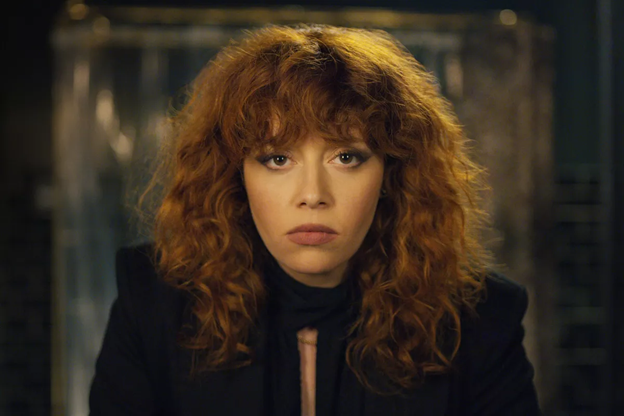
RUSSIAN DOLL (Netflix)
What would you do if you respawned? If every time you died, you just woke up a few hours before your death in the same spot. And what if, no matter what you did, you just kept dying, but in increasingly wacky fashion? Would you keep trying to live a life, or just stay at your spawn point? Would you try different approaches, say and do different things just to see if it changed anything? What if none of those choices mattered and you ended up leading a parade of costumed miscreants in a revelrous display through the city? RUSSIAN DOLL asks and answers many questions that I’d never before considered, and watching it is a strange journey that made my head spin in an infinite pattern of circles.
I’m sick of antiheroes who operate in morally grey areas and require the application of cognitive dissonance to enjoy. Natasha Lyonne’s breakout star Nicky in ORANGE IS THE NEW BLACK is one such character, and she’s brought that irresistible scrapy charm again to Nadia. Effortlessly funny with just the right amount of grit, Nadia adds needed stability to the outside-the-box trippiness that is RUSSIAN DOLL’s plot.
While it’s easy to consider this a dark comedy about escaping a horrifying prison of infinite recurrence, I prefer to see it as a story of personal growth. From watching Nadia figure out how to descend her apartment’s staircase to her learning that she and Alan need to help each other, RUSSIAN DOLL is ultimately about the grueling but rewarding process of becoming a better person. It’s a brief four-hour journey that warrants multiple viewings to catch smaller details like the symbolism of the video games and the various locales like the synagogue and Central Park. Seemingly simple with vivid riches hidden in the details, not unlike the matryoshka dolls that inspired the title, RUSSIAN DOLL contains multitudes. [Dan Blomquist]
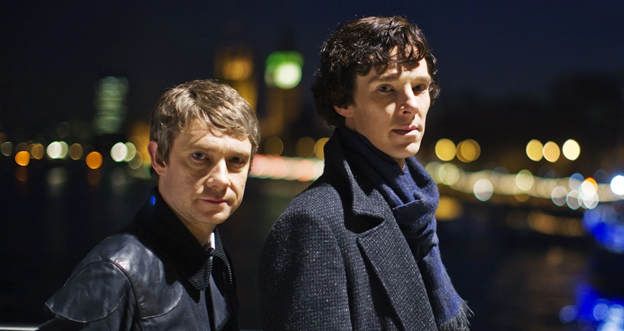
SHERLOCK (BBC)
In this age of reimaginings and reboots, we’re barraged with dusty, classic literature titles. DRACULA. ANNE WITH AN E. LITTLE WOMEN. It’s a bibliophile’s wet dream. But we forget that, not so long ago, things were not so. As the past decade crested and 2010 found its feet, a peculiar, provocative mini-series came to fruition—an adaptation of Sir Arthur Conan Doyle’s titular detective, Sherlock Holmes.
Helmed by DOCTOR WHO’s Steven Moffat and frequent guest star and folly, Mark Gatiss, SHERLOCK debuted as a stylish, sexy, little gay modern adaptation. It’s fresh, fun, and whip-smart. Benedict Cumberbatch shines as Sherlock, a quirky, crime-solving savante, who’s as devilishly charming as he is cruel. He’s joined by Martin Freeman’s Watson: a sputtering, bumbling former Army medic who blindly follows Sherlock in an awed fog. But together, they’re pure electricity. Full of wild energy and manic hysteria.
The mysteries are enchanting, challenging you to try and beat Sherlock to the reveal. Try as you may, however, you’ll never guess the twists. It’s one of the first of its kind to take something old and truly infuse it with it with the technology and madness of the modern world. The only downside to this show are the several-year hiatuses between seasons. Maybe we’ll get a S5 in 2021! [Tracy Nicoletti]
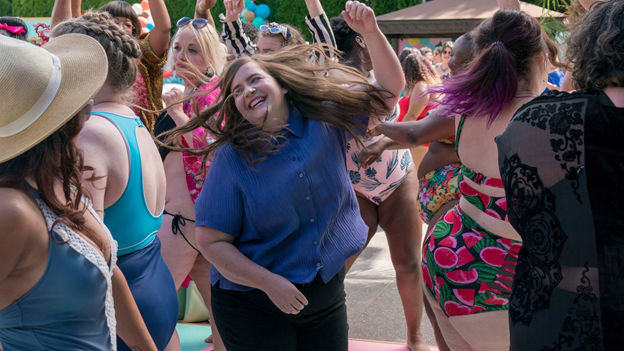
SHRILL (Hulu)
Very few movies and TV shows feature characters that resonate with someone like me, and even fewer are the main protagonists. Fat chicks are the punchlines. Fat chicks are the funny, undateable ones. Fat chicks are just parts of the cool, skinny girl’s ensemble. They’re not the leading ladies. Well, SHRILL’s here to change that.
Meet Annie, a self-conscious writer who struggles to find love and a leg up in life. Her boss never gives her a chance. Her fuck buddy’s ashamed of her. And none of that would have changed if she hadn’t hit rock bottom. Determined to carve a new path for herself, Annie leaves toxic relationships in the past, instead focusing on being fat-forward and proud of her curves.
SHRILL makes me proud to be a fat chick. It’s like I’m on this journey with her, experiencing the same ups and downs. It’s inspired me to self-reflect and think about the things in my own life that are (literally) weighing me down. Bad boyfriends, catty friends. No one needs that negativity. Not me, not Annie. And I for one am excited to see where that next step takes us both. [Tracy Nicoletti]
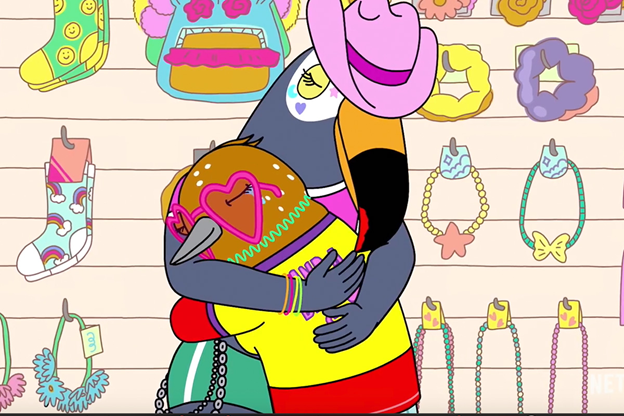
TUCA & BERTIE (Netflix)
Admittedly, when I first saw the trailer for TUCA & BERTIE, I thought I had a pretty good idea of what was to come. BROAD CITY humor in a BOJACK HORSEMAN art style? I was in. For the first episode, that assessment seemed accurate. The loud, bright, irreverency of the episodes felt tonally aligned with the hijinks of Abby and Ilana. However, with absolutely no shade to BROAD CITY (because it’s perfect and deserves the world), TUCA & BERTIE quickly pivots to distinguish itself as something much more compelling, deep, and dark. Set in a fictional, bird-centric city, the show follows best friends Tuca (a toucan, played by Tiffany Haddish) and Bertie (a songbird, played by Ali Wong) as they grow up, grow apart, and grow together. While the initial episodes surround relatable 30-something premises (a best friend moving in with a significant other), the show shifts several episodes in as it begins to tackle womanhood, consent, trauma, and the age of #MeToo.
The brilliance of the show doesn’t just come with their efforts to broach such topics, but the success in folding them in seamlessly to the series. Creator Lisa Hanawalt (originally of BOJACK acclaim) treads the line of humor and heartbreak so effortlessly, it’s almost easy to forget how groundbreaking it actually is. While cancelled after only one season, the show made a name for itself among loyal fans and critics alike. It’s truly a must-see, not just for animation fans, but connoisseurs of Peak TV in general. [Anna Thorup]


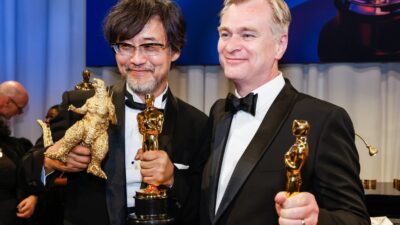
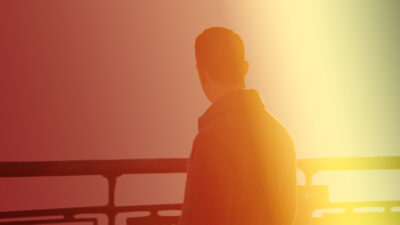
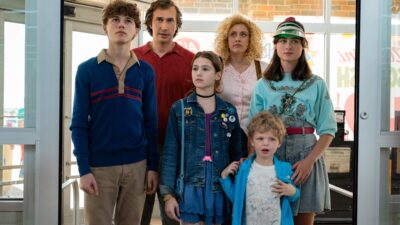
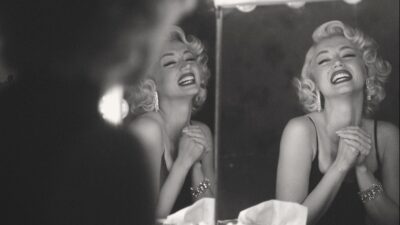

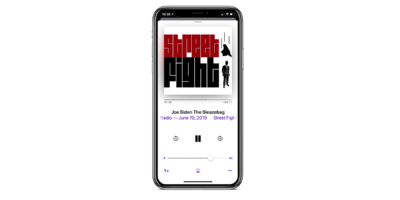
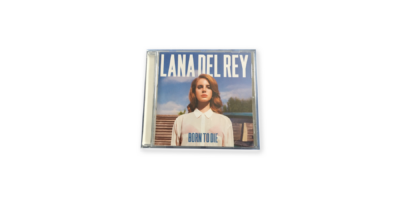
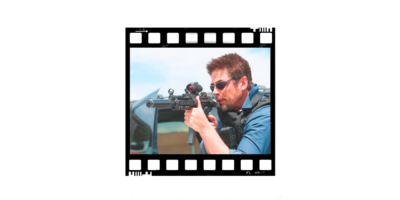

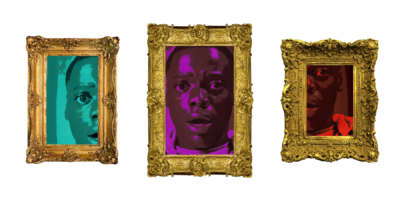

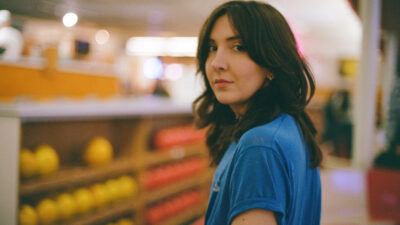

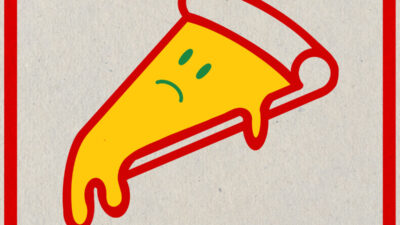
Comments